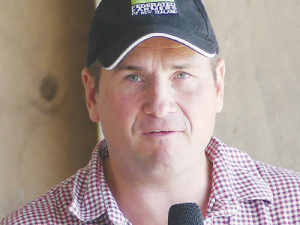NZ Catchment Groups Thrive with ‘Source to Sea’ Approach
The most successful catchment groups in NZ are those that have 'a source to sea' approach.
 Dunsandel dairy farmer Michael Woodward was a finalist in this year’s Primary Industries Good Employer Awards. Rural News Group
Dunsandel dairy farmer Michael Woodward was a finalist in this year’s Primary Industries Good Employer Awards. Rural News Group
The ‘big thing’ in employing farm staff is to invest in them, says Dunsandel farmer Michael Woodward.
“We try to grow these people as much as we can, while they’re in our farming group,” he says.
Woodward and his wife Susie were finalists in the inaugural Primary Industries Good Employer Awards, having been nominated in the Agriculture Minister’s Award category. The winners were announced at Parliament last week.
Read: Best primary sector employers announced.
He says the key to being a good employer is “making sure we are one of the vehicles on their journey, and making sure that when they leave the farm they are a better person through being involved in our system”.
The couple are 50:50 sharemilkers on 294ha (effective) milking 1020 cows through a 50-bail rotary. They are also now expanding into a small Angora goat operation on their home block.
They employ six full-time and have run many properties in the past with up to 19 people on the books at one stage.
“So we’ve had a bit of experience employing people on the way through. We found things we were cognisant of when we were employees – things that we liked or didn’t like that our employers did, and we thought we could do better,” said Woodward.
He said he was “really stoked” to be nominated for the award by their DairyNZ consulting officer Natalia Benquet.
“Not to say that we get it right all the time but obviously [Benquet] believed we were doing something good for the industry.”
Woodward, who is also the Federated Farmers North Canterbury dairy chairman and vice-chairman and regional manager of the Dairy Industry Awards, recently became farm operations manager for his farm owners, the Purata Farms group.
“We’re still 50:50 sharemilking but because we employ the team we get to do it how we want within the wider system.”
Communication with staff is very important, as is making sure no-one was doing “big hours”.
His staff averaged about 45 hours a week through the high workload spring season.
Woodward said keeping an extra half to full labour unit employed gives sickness and holiday cover so the others don’t have to “work their butts off”.
Horticulture New Zealand (HortNZ) has added its perspective to numerous primary sector voices urging the Government to strengthen its draft legislation to replace the Resource Management Act (RMA).
The Commerce Commission has finalised new information disclosure requirements for local councils and water organisations that deliver water supply and wastewater services.
Beef + Lamb NZ (B+LNZ) is calling for significant changes to the Government’s reforms to the Resource Management Act (RMA).
NZPork says the Government needs to strengthen its proposed planning laws to ensure New Zealand's pig farmers can continue to produce pork.
Good news for kiwifruit growers - a record crop with forecast per hectare returns at record levels for all fruit categories for the 2025-26 season.
As guests gathered on what is known as the Speaker's Lawn - a beautifully manicured patch of grass behind the main buildings of Parliament - to mingle and enjoy a lamb chop to celebrate National Lamb Day, the mood was very much upbeat.

OPINION: The proverbial has really hit the fan in Wellington and exposed a glaring example of a double standard in…
OPINION: Dark suited spin doctors exist to, well, spin, and the nice cuddly progressive types at Greenpeace Aotearoa practice this…